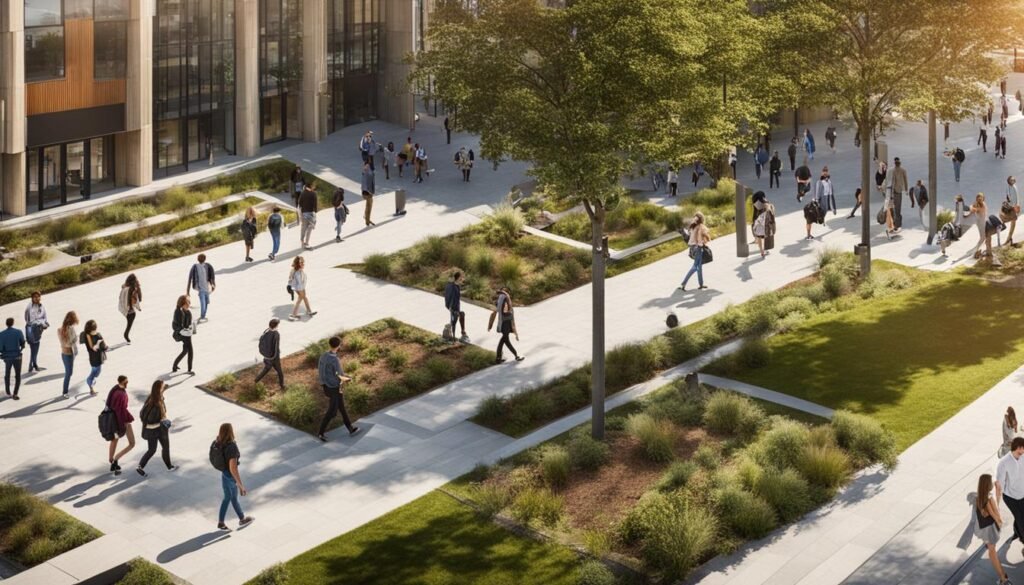Visiting colleges before making a final decision on which one to attend is a crucial step in the college selection process. It allows prospective students like you to get a firsthand look at the campus, interact with current students and faculty, and gather important information about the college’s academic programs and extracurricular activities.
Campus tours provide an opportunity for you to explore the facilities, including classrooms, libraries, dormitories, and recreational spaces. It’s a chance to see where you’ll be spending a significant amount of your time as a college student.
But it’s not just about the physical environment. It’s also about assessing whether the campus culture and community align with your academic and social aspirations. By touring college campuses, you can get a sense of whether you’ll feel at home and thrive in that particular environment.
When it comes to making an informed decision about where to pursue higher education, touring college campuses is an essential part of the process. It allows you to gather all the necessary information, assess the fit, and ultimately choose the college that is right for you.
The Importance of Campus Visits
Visiting colleges before making a final decision is a pivotal step in the college selection process. It offers numerous benefits that can greatly impact your overall college experience and help you make an informed decision.
When you visit a college campus, you get to experience its unique culture and atmosphere firsthand. This allows you to envision yourself as part of the community and determine if it feels like a good fit. The vibe of a campus plays a crucial role in your happiness and success during your time at college.
Furthermore, campus visits provide the opportunity to meet with faculty members and admissions staff. These individuals can offer valuable insights into the academic programs, support services, and resources available. Asking questions and engaging in discussions with current students also provide valuable insights into college life and can help you better understand what to expect.
Moreover, visiting multiple colleges allows you to compare and contrast different campuses, program offerings, and student life. This comparative analysis aids in your decision-making process and ensures that you choose the college that best aligns with your academic and social aspirations.
The Benefits of Campus Visits:
- Experience the campus culture and atmosphere
- Visualize yourself as part of the community
- Interact with faculty members and admissions staff
- Ask questions and gain insight from current students
- Compare and contrast different campuses and programs
- Make an informed decision based on firsthand experiences
By taking advantage of campus visits, you gain a comprehensive understanding of the colleges you are considering. This firsthand knowledge allows you to make a more informed decision about which college will be the best fit for your academic and social growth.
So, don’t underestimate the importance of visiting colleges. It’s an opportunity you won’t want to miss!

Factors to Consider During Campus Visits
When visiting colleges, there are several key factors that you should consider to make an informed decision about which college is the best fit for your academic and social aspirations.
Firstly, evaluate the academic programs and majors offered by the college. Consider whether they align with your career goals and interests. This will ensure that you have the opportunity to pursue your desired field of study and excel in your academic journey.
Next, take the time to explore the campus facilities. Visit the libraries, labs, and technology resources to assess the resources available for academic success. A well-equipped campus with state-of-the-art facilities can greatly enhance your learning experience.
During the campus tour, pay close attention to the campus community and social aspects. Evaluate the clubs and organizations, extracurricular activities, and student support services offered. These factors contribute to your overall college experience and can help create a vibrant and engaging campus life.
Don’t forget to consider the location and campus size. Think about whether you prefer a bustling city or a more serene environment. Additionally, consider the overall cost of attendance, including tuition, fees, and available financial aid. Ensure that the college offers a financial package that suits your needs.
By considering these factors when visiting colleges, you can create a comprehensive campus tour checklist and evaluate the fit between your expectations and the offerings of each college. This will help you make an informed decision about which college will provide the best environment for your academic, personal, and social growth.

Making the Most of Campus Visits
To maximize the value of your college campus tours, there are several key strategies you can employ to gather the most relevant information and make an informed decision. One important aspect is to come prepared with a list of questions to ask during your campus visit. This allows you to delve deeper into specific areas of interest and ensures that you don’t miss any important details.
When exploring the campus, be sure to inquire about the academic programs that interest you. Ask about the course offerings, faculty qualifications, and any unique opportunities such as study abroad programs or research initiatives.

It is also important to inquire about internship opportunities and career services. Find out if the college has strong connections with local businesses and organizations that can provide valuable internship experiences. Additionally, ask about the resources available to students for career development, such as resume building workshops or networking events.
Another aspect to consider during your campus visit is the campus community and student involvement opportunities. Inquire about clubs, organizations, and extracurricular activities that align with your interests. This will give you an idea of the social and cultural aspects of college life.
Don’t forget to ask about housing options as well. Find out about the different types of dormitories available, their proximity to academic buildings, and the amenities offered.
Speaking with current students and faculty members can provide unique insights into the college experience. Take the time to engage in conversations and ask about their personal experiences, academic challenges, and favorite aspects of the college.
Attending information sessions or admissions presentations can also provide valuable information and help you gather additional insights about the college. Make sure to take notes during these sessions to refer back to later.
Lastly, take the time to explore the surrounding area and research potential off-campus opportunities. Find out about the local attractions, internships, part-time job opportunities, and community engagement programs that may enhance your college experience.
By actively engaging in your campus visit, asking relevant questions, and gathering all the necessary information, you can make a well-informed decision about which college is the best fit for your academic and social aspirations.
Conclusion
Choosing the right college is a significant decision that can shape your future. The college selection process involves considering various factors, including academic programs, campus resources, and the campus community. However, one of the most crucial steps in making an informed decision is by visiting colleges in person.
By touring campuses, you gain firsthand insights into the college’s academic environment, campus culture, and social atmosphere. This experience allows you to evaluate whether the college aligns with your academic and social aspirations. It’s an opportunity to interact with current students and faculty, ask questions, and get a feel for the campus life.
During your campus visits, carefully consider factors such as the availability and quality of academic programs and resources, the campus community and extracurricular activities, and the overall fit with your interests and goals. By weighing these factors and considering their importance to you, you can make a well-informed decision about which college is the right fit for you.
Remember, online research can provide valuable information, but nothing compares to experiencing a college firsthand. Touring college campuses provides invaluable insights that can significantly impact your decision-making process. So take the time to visit colleges, explore the campuses, engage with the community, and make the final decision about the college that will pave the way for your academic and social growth.
Source Links
- https://www.lemonde.fr/en/le-monde-africa/article/2024/01/21/how-uganda-became-a-hotbed-for-cryptocurrency-scams_6452092_124.html
- https://www.wral.com/story/rats-and-mice-swarm-trenches-in-ukraine-in-grisly-echo-of-world-war-i/21246326/
- https://www.cbsnews.com/news/cayley-mandadi-death-mark-howerton-trial-texas-48-hours/


